Hotel night guard ‘was working at Coles during the day’
A hotel quarantine guard was sent home from a 12-hour night shift because he was exhausted from working at Coles in the day, the inquiry heard.
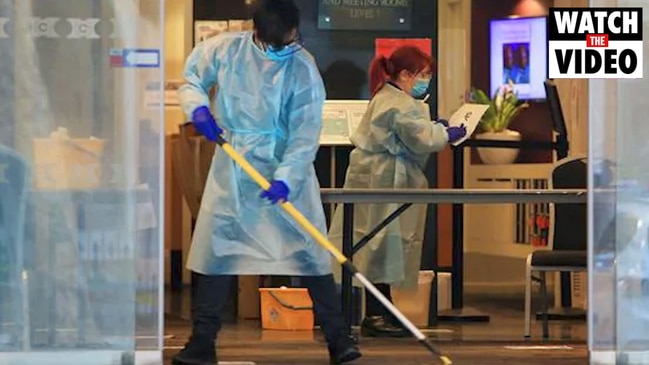
A security supervisor from one of Melbourne’s quarantine hotels has revealed one guard was working shifts at Coles before a 12-hour shift at the hotel.
Speaking to the inquiry under the pseudonym ‘Security 1’, the man explained he was subcontracted as a floor manager at the Crowne Plaza Hotel, where he was in charge of guards on two-three floors.
In a lengthy submission about his experiences, tendered to the inquiry before he appeared, Security 1 said he was concerned about guards working across different hotels, or across different jobs while employed at one of the hotels.
“While I was working at Crowne Plaza I had to send a guard home as he was working 12 hour shifts for us in security but was also working some day shifts at Coles,” the submission read.
“I had to send him home at one point because he extremely tired, and his position was covered by a ‘spare’ guard, of which there was usually one per shift to cover such contingencies.”
Security 1 further alleged guards were working between hotels, with some working at the Pan Pacific and Crowne simultaneously.
“There were a few guards that I was familiar with when I was working at the Crowne and some of them, I would see them coming in on the tram and sometimes they would go to the Crowne and sometimes they would be at the Pan Pacific,” he said.
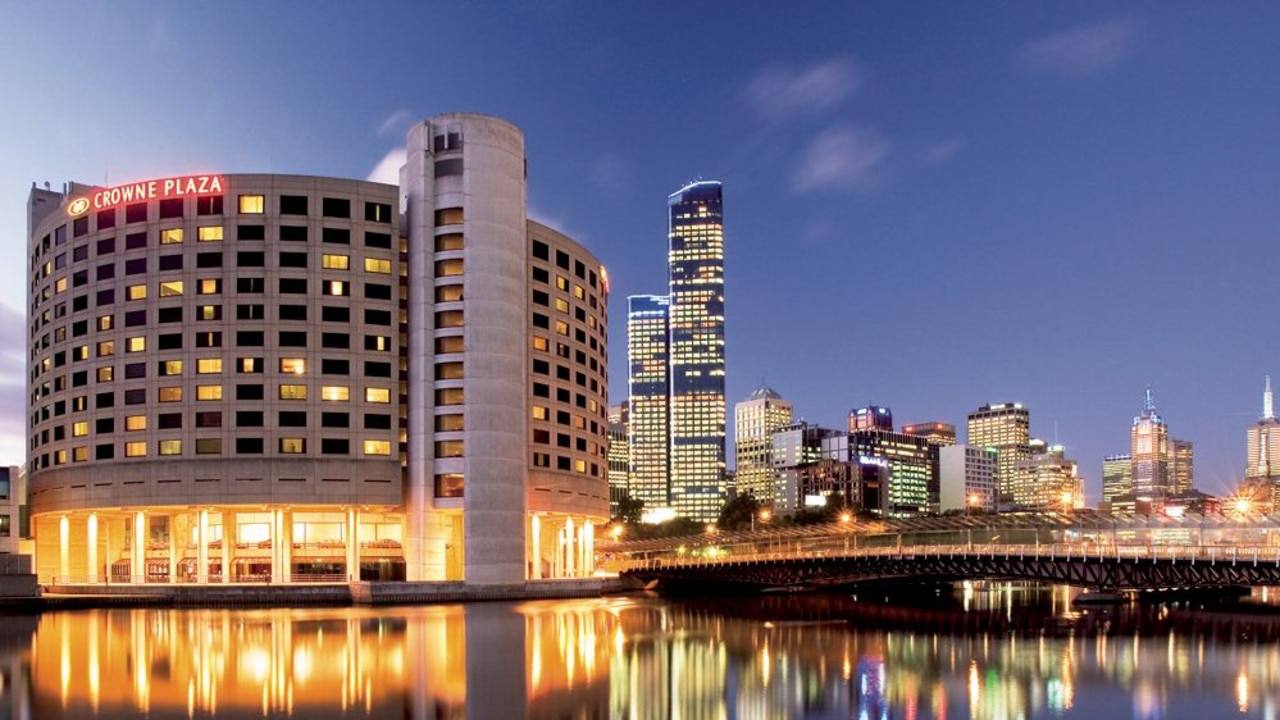
He claimed the guards had been “very casual” in the way they had worked, and was relieved when they were moved on from the Crowne, but concerned to discover they were still working – but now only at the Pan Pacific.
Later, Security 1 had moved from the Crowne to the Pullman Hotel, where he alleged he had heard nurses discussing shifts at different hotels, and claimed other staff were moving between the Pullman and the Mercure hotel.
“I heard one nurse say she had shifts at the Austin (hospital) after being at the Pullman,” he said.
The supervisor said the Pullman and Mercure Hotel were “essentially adjacent to each other” and shared a common area.
“I guess the kitchen staff do meals for both hotels and even though the two hotels had sort of separate lift areas, they were in a sort of common area,” he said.
“They were essentially sort of two hotels that were split down the middle. So there was, you know, staff going back and forth between both of those hotels.”
When asked if he was aware of staff going back and forth from other hotels as well, he answered: “Yes, that’s correct”.
Security 1 said he was “was concerned about the risk of cross-contamination between the hotels because of the movements of guards, nurses and DHHS staff”.
Speaking to the inquiry, he said it “goes without saying” that staff should not have been allowed to move between quarantine hotels if the government’s aim was to control the spread of the virus.
“Considering how ridiculously communicable this virus is I just thought that was, you know, asking for trouble,” he said.
INSIDER REVEALS CHAOTIC HOTEL QUARANTINE
A man who worked as an authorised officer at seven different Melbourne quarantine hotels says he had no training in infection control, little understanding of what his actual job was, and quit after four weeks because he felt the job was so dangerous.
Luke Ashford, a senior employee with Parks Victoria, was seconded to assist with the hotel quarantine program on May 25.
By June 18 he had quit, writing in his resignation email that he felt the Department of Health and Human Services had not and could not provide him with a safe workplace.
He told the Melbourne quarantine inquiry on Friday that across roughly 20 shifts at seven different hotels “there was never anyone formally identified as being in charge”.
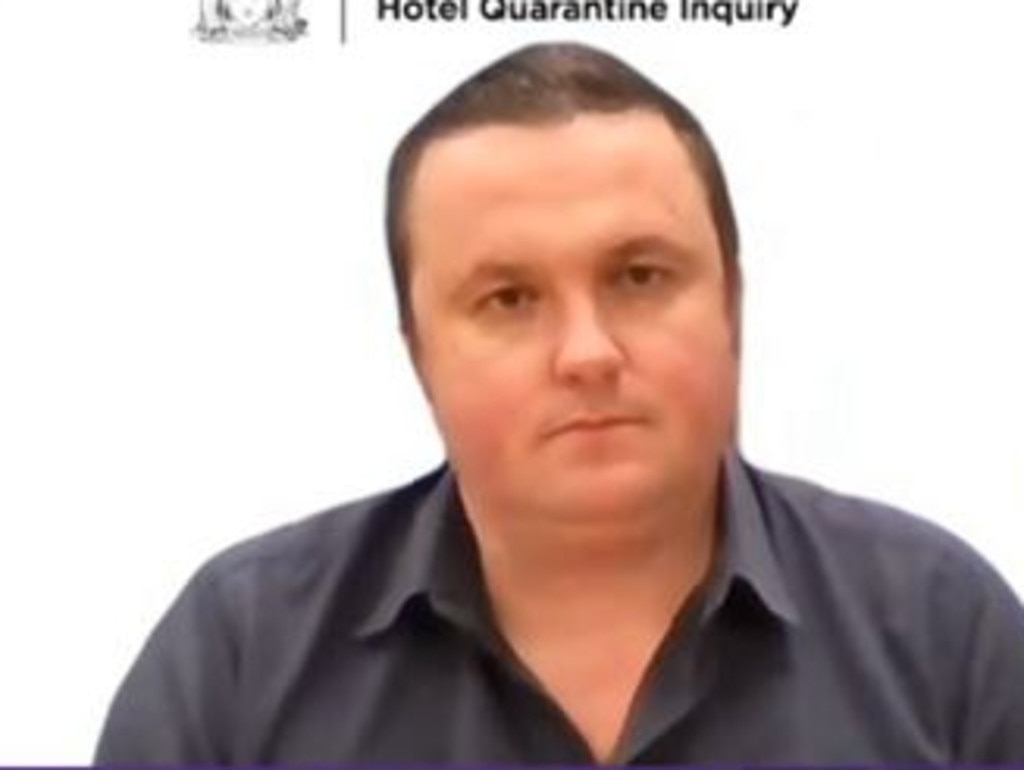
Every hotel delivered the program in a different way and protocols changed regularly, he said.
The final straw came during a shift at the Mercure Welcome, just after Mr Ashford had learned about an outbreak at the Stamford Plaza hotel.
A morning briefing was held, during which social distancing requirements weren’t met, he said.
Then a large intake came through the hotel, where the foyer set up was “not fit for purpose”. Procedures started to slip with elevators, baggage handling, and other risky parts of the process, he said.
That day Mr Ashford decided the job had become too much of a risk, both for himself and his family, he said. “I didn’t want to be the guy that shut my daughter’s school down.”
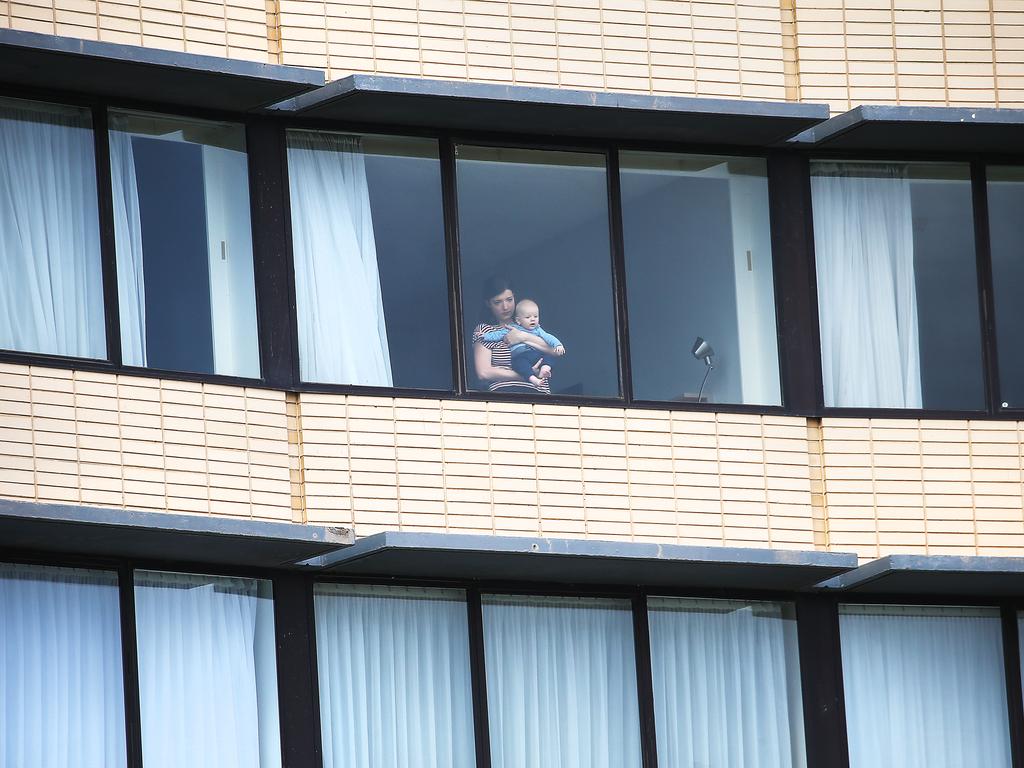
GUARDS ‘BREACHED INFECTION CONTROL’
A woman protested in hotel quarantine by refusing to report COVID-19 symptoms to nurses after her concerns about infection control and high risk patients went ignored, an inquiry has heard.
Returned traveller Liliana Ratcliff told the inquiry in Melbourne’s quarantine hotels that she was “tearing her hair out” in quarantine over how infection control was handled, her concerns based on her 20 years working in hospitals and public health.
Security guards were helpful and kind but regularly breached infection control and social distancing guidelines, Ms Ratcliff said, and she became concerned about her safety.
She felt even the nursing staff did not observe the types of protocols that would have been in place in a hospital, such as changing gloves between testing patients and taking a cart between rooms while swabs were being administered.
Ms Ratcliff began to answer “I do not consent to answering your questions about COVID symptoms because I’m protesting” when nurses rang, and then tell them about a concern she had in relation to mental health, infection control, or high risk patients.
About eight days in, Ms Ratcliff said, she got a call from the nursing manager. “He basically said, you’re making our job difficult, can you just answer the questions?” she said, adding that she said “No” and urged him to escalate her concerns.
At one point, she said, a nurse rang when she was in the shower and when Ms Ratcliff’s 13-year-old daughter answered the phone said “Great, it’s not your mum, can you just answer the COVID-19 questions?”
“They a little bit dreaded calling me, I think,” Ms Ratcliff said, saying she was never rude but just calmly stated her objections.
She eventually filed a written complaint to DHHS, in which she wrote among other things: “I cannot believe this detention is mandatory even for disabled persons, those with mental health issues, the elderly and those with dementia, and children and pregnant women.”
She said she still had no response to her written complaint months after exiting quarantine. “I couldn’t help but say something.”
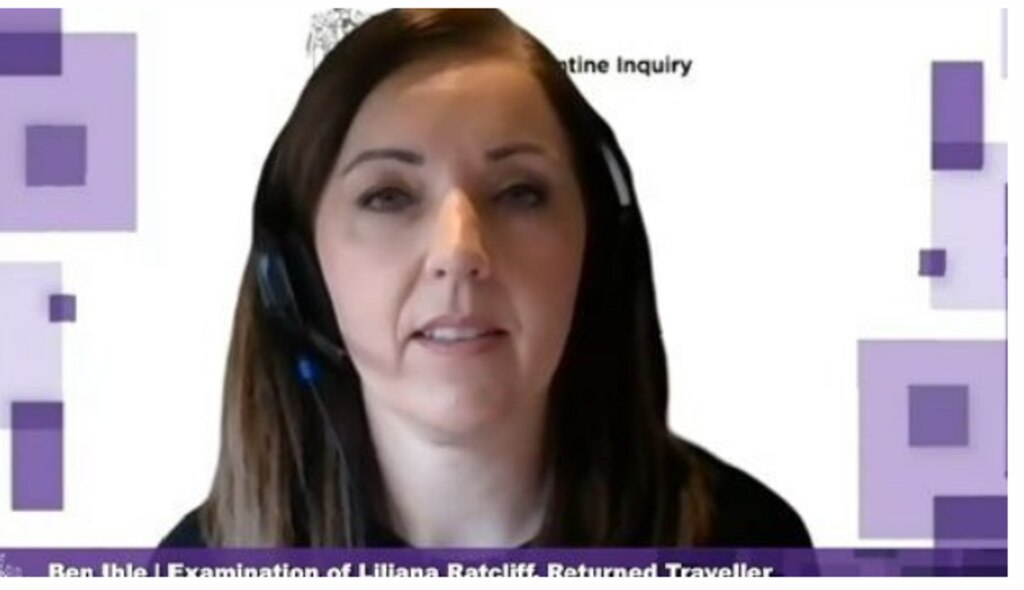
BROKEN ANKLE, EXTREME STRESS
A woman fractured her ankle and then slipped a disc while struggling to get into an inaccessible shower while using crutches as she was held in hotel quarantine, an inquiry has heard.
Sue and Ron Erasmus quarantined at the Stamford Plaza hotel with their two children, aged 14 and 9, throughout the first half of May.
Mr Erasmus’s father had died in South Africa on March 30, and the family encountered cancelled flights and other difficulties as they tried to get back to Australia.
Mrs Erasmus said her husband’s stress had boiled over as he struggled with his grief within the confines of an airless hotel room.
“I’ve never seen him like that,” Mrs Erasmus said. “He was extremely out of character. He was very agitated.”
Mrs Erasmus tried to get her husband help, but after he initially agreed to try counselling — a “big step” — he was put off by having to endlessly re-explain his father’s death to a number of people on the phone.
Their quarantine difficulties were compounded when Mrs Erasmus fractured her ankle during a fresh air break.
After she fell playing a game with the family in the hotel bar, security guards rushed into the room and told the family they had to return to their room immediately, Mrs Erasmus said.
She was in “agony” and unable to put weight on her foot, so her husband carried her back to their room and then called a nurse, she said.
“It was our impression [the security guards] had no training in how to deal with a first aid situation other than to keep their distance from us,” the couple wrote in their statement.
Barrister Anna Robertson, acting for MSS Security, suggested the guards were in fact trained in first aid. Mr Erasmus agreed they may have been but said again that the guards had simply stood there and done nothing.
Mrs Erasmus struggled to use the shower in the room, which was located in a bathtub, with her fracture but the only option to changing rooms would have required the parents to be in one room and their children separated in another, the couple said.
She continued to use the shower and slipped a disc while trying to get in.
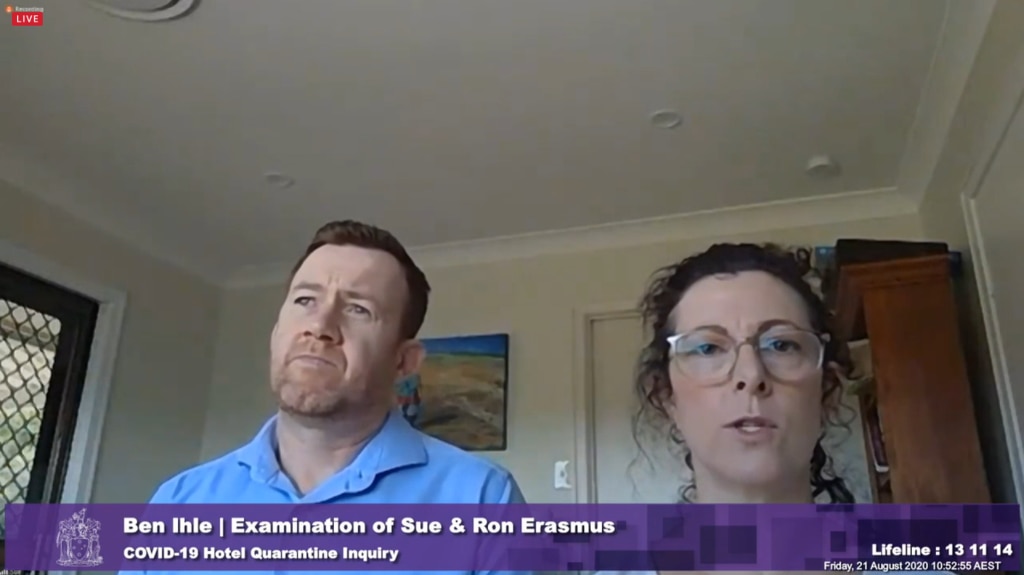
PHOTOS OF UNCLEAN ROOM REVEALED
Shocking photos tendered to Melbourne’s quarantine inquiry show a used face mask and gloves and a stained doona left behind in a dirty hotel room where a family of four had to quarantine for a fortnight.
The inquiry into Melbourne’s ill-fated hotel quarantine program, which spawned 99% of all current cases in the state, heard evidence this week from return travellers, nurses and infectious disease experts.
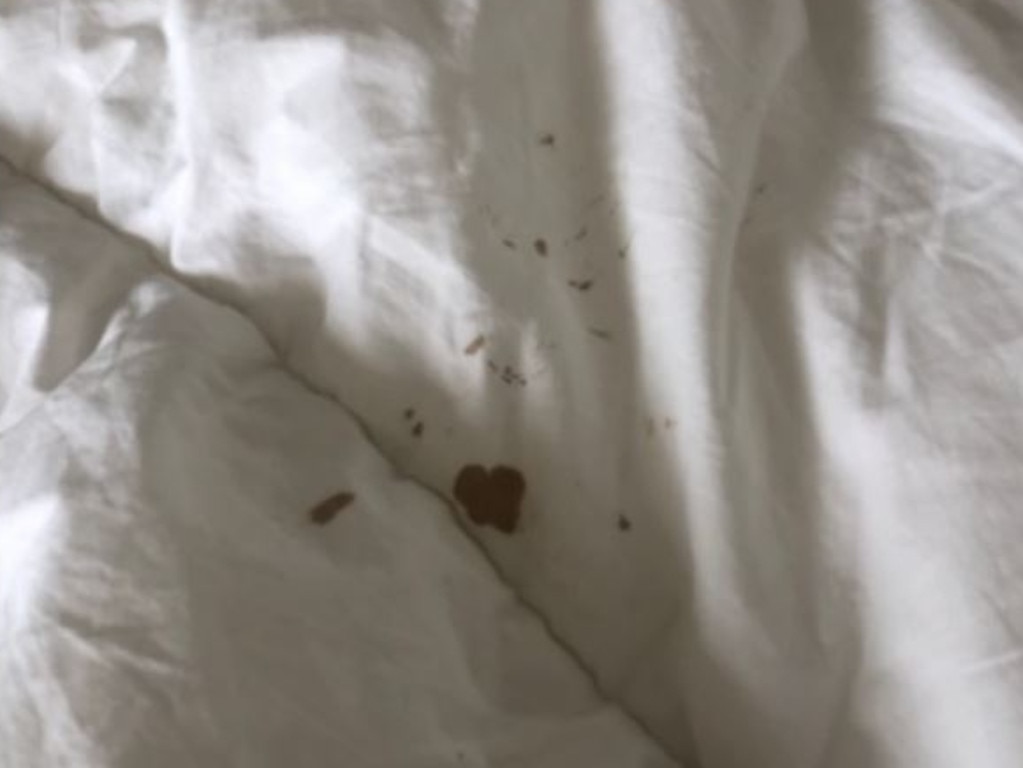
Hugh de Kretser, a human rights lawyer, quarantined with his family at the Rydges Hotel on Swanston Street between June 27 and July 9.
The family of four stayed in two adjoining rooms. Mr de Krester said he had expected the hotel to be extremely clean, following reports about COVID-19 outbreaks at Rydges and the Stamford Plaza.
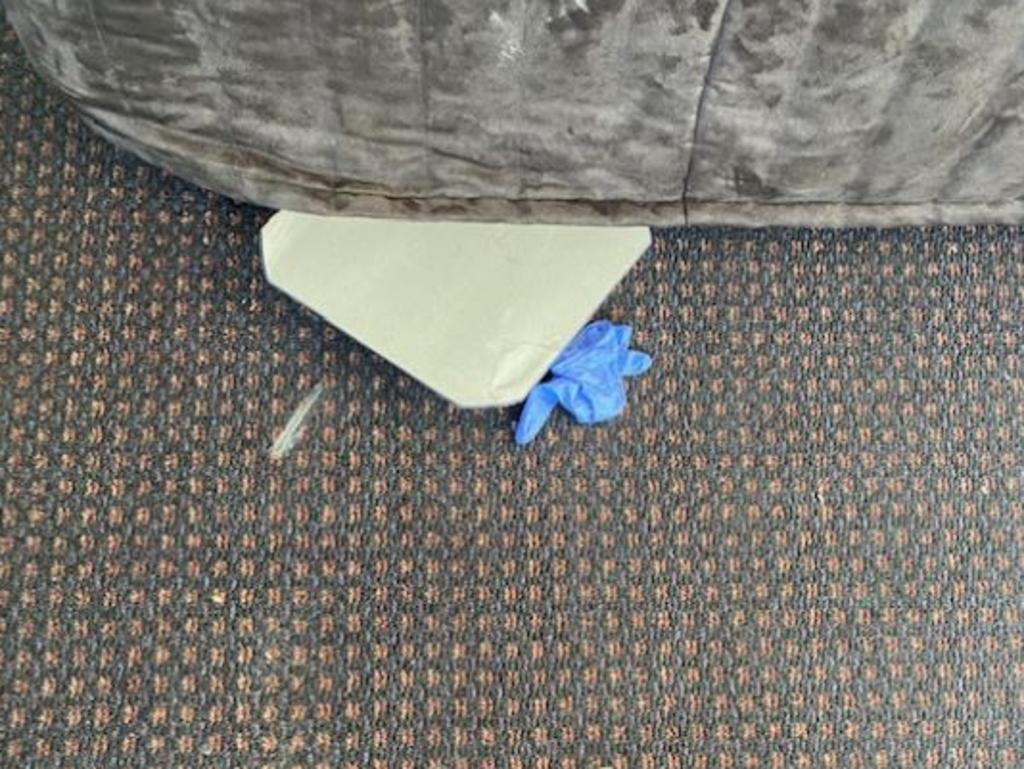
“Given the reports, we expected that our room would be thoroughly clean and smelling of disinfectant. It was the opposite,” Mr de Kretser said.
“We found a plastic glove and a children’s toy at the edge of one of the beds. I found a face mask under another bed and later found another plastic glove.”
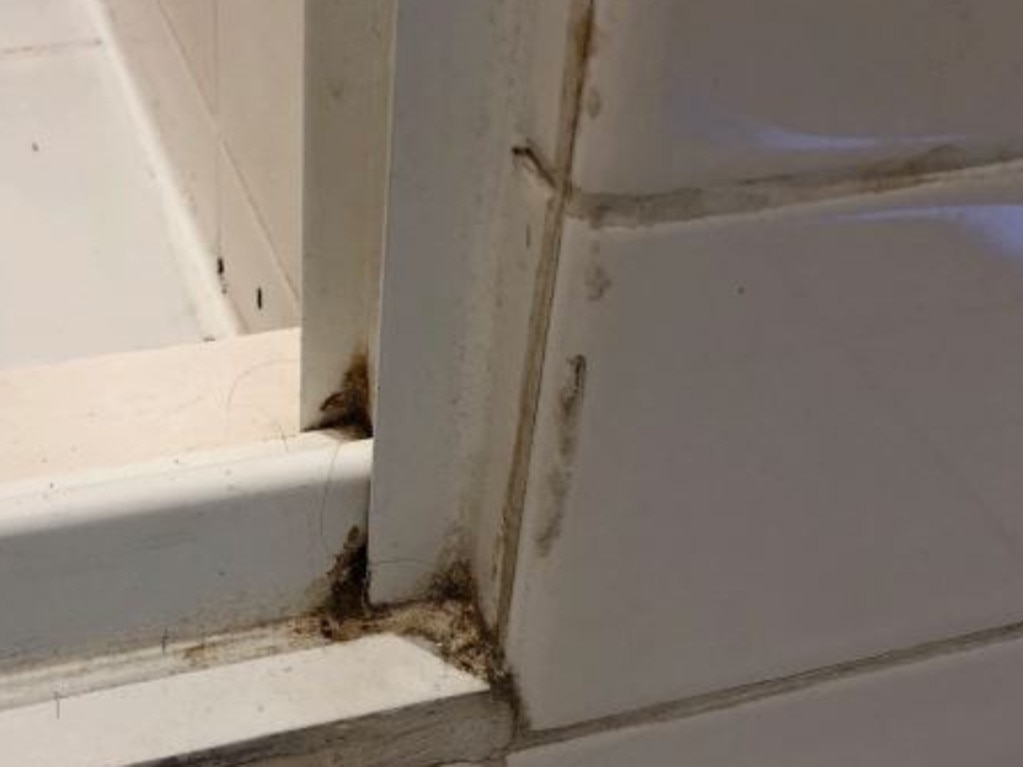
“There were food crumbs on the floor, stains on the doonas and walls, mould in the bathroom and dust everywhere.”
The unclean room left Mr de Kretser and his family concerned about their safety and completely undermined their confidence in the infection control procedures in place at the hotel, he said.
They were sent cleaning products by family members and cleaned the hotel rooms themselves, he said.
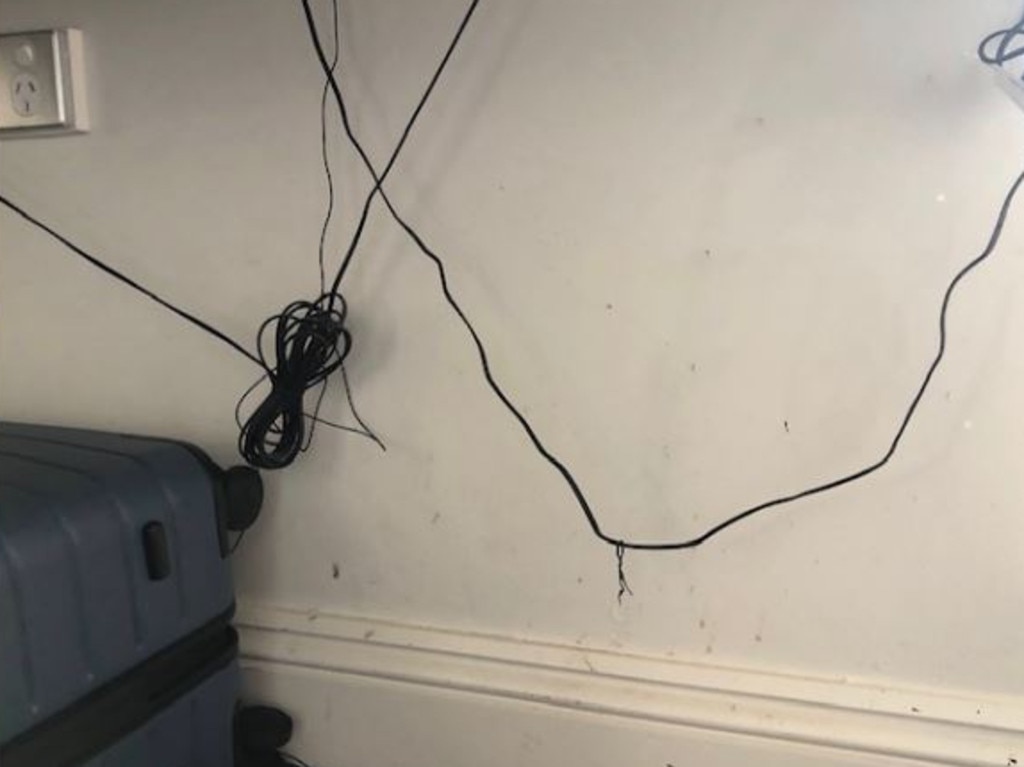
Significant amounts of dust in the room also left Mr de Kretser concerned about his son, who has asthma and had no access to fresh air for 12 days while in quarantine.
Fortunately his son had mild asthma for the first few days, but then it subsided, he told the inquiry.
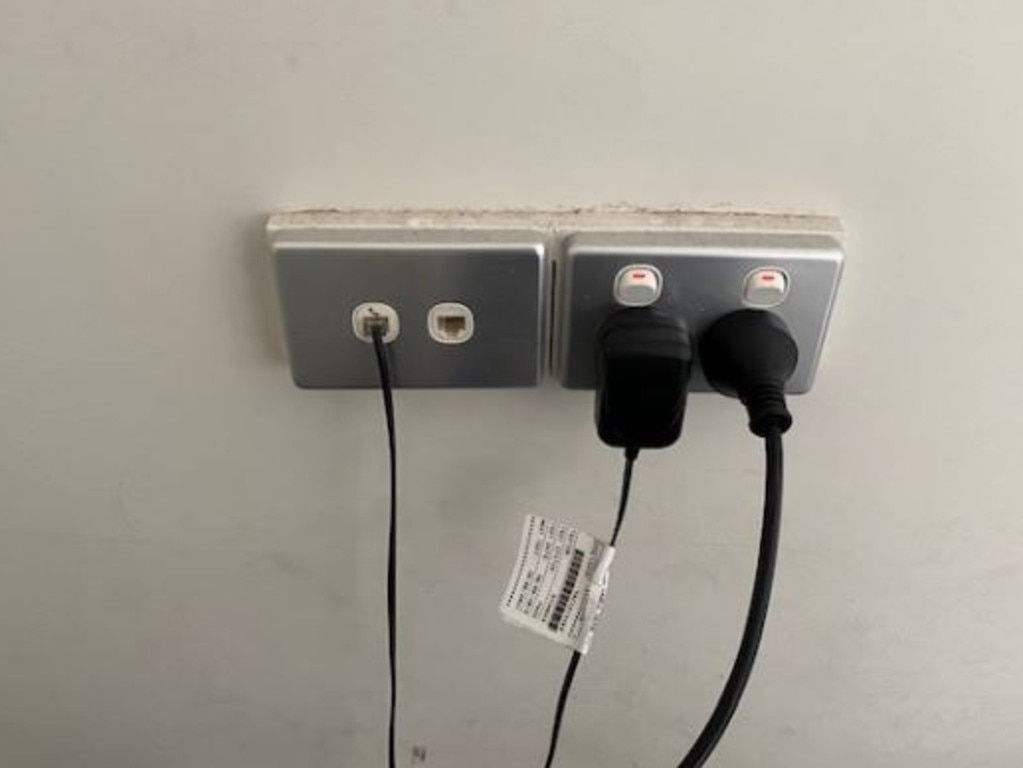
Mr de Kretser, the executive director of the Human Rights Law Centre, also gave evidence about the human rights issued presented by the quarantine system.
He strongly supports quarantine, he told the inquiry, but has concerns about the lack of fresh air and opportunities for exercise afforded to hotel guests and in particular the impact this could have on vulnerable people.
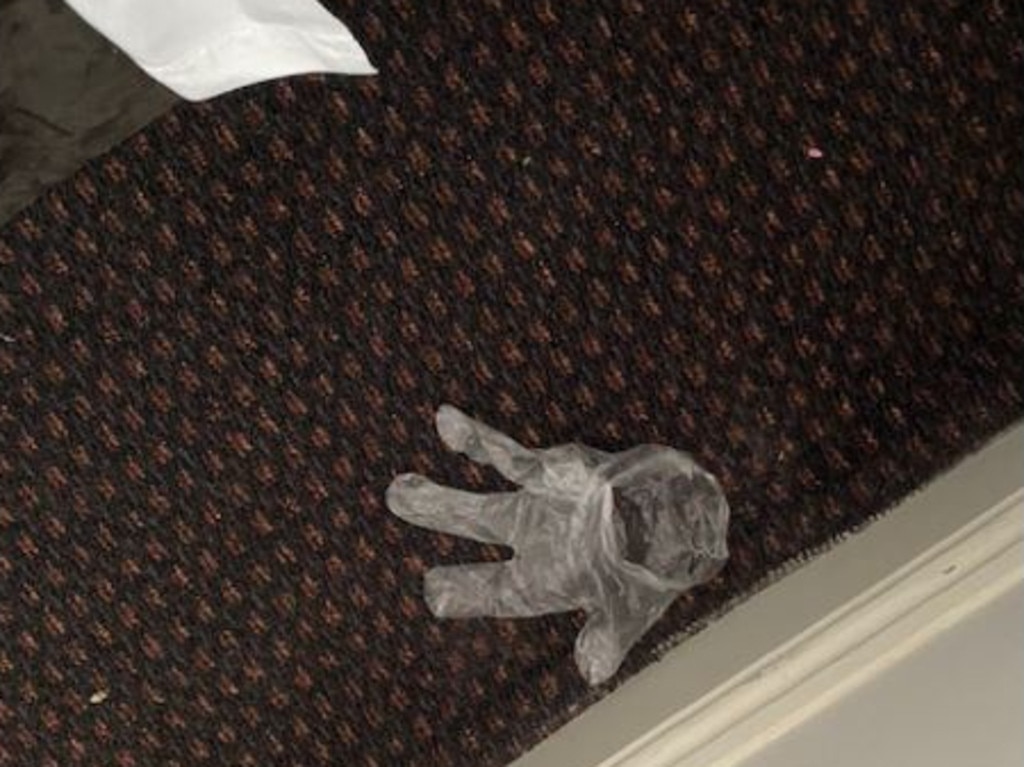
The inquiry continues today with returned travellers Sue and Ron Erasmus and Liliana Ratcliff scheduled to give evidence this morning, authorised officer Luke Ashford at midday and an unnamed security guard at 2pm.
Read related topics:Coles



